Alfredo asked us to offer ideas for how to fast during Lent:
What to eat during fasting (other than cranberries & coconut oil) is on my mind. Looking for some variation in the fasting menu.
It’s a great question. We did have a post on one possible fasting food – Neo-Agutak: “Eskimo Ice Cream” – but never discussed alternatives or the reasons for eating particular foods during a fast.
Fasts don’t have to be food-free
Some people think a fast should involve no food at all. On the Neo-Agutak post, Don Matesz commented:
I would not say that I was fasting if I consumed more than 625 calories during any period of that “fast.”
But that’s not the position of the Catholic Church. During Lent, Ash Wednesday and Good Friday are fast days. The US bishops allow one full meal and up to two snacks:
The law of fasting requires a Catholic from the 18th Birthday (Canon 97) to the 59th Birthday (i.e. the beginning of the 60th year, a year which will be completed on the 60th birthday) to reduce the amount of food eaten from normal. The Church defines this as one meal a day, and two smaller meals which if added together would not exceed the main meal in quantity. Such fasting is obligatory on Ash Wednesday and Good Friday. The fast is broken by eating between meals and by drinks which could be considered food (milk shakes, but not milk).
Children, the elderly, and those whose health might be threatened are exempt from the requirement to fast.
So let’s consider a fast to be any period of reduced calorie consumption – not zero food.
Basic fasting: Electrolyte and fluid replacement
It is certainly a mistake to consume nothing at all during a fast.
People deprived of fluids and electrolytes die quickly. In a famous case cited in Wikipedia (“Starvation”), Drusus Caesar, son of Agrippina the Elder, was starved to death in 33 AD by the emperor Tiberius, and managed to stay alive for nine days only by chewing the stuffing of his bed. When Saint Maximilian Kolbe and nine others were starved in Auschwitz, seven of the ten died within two weeks.
When fluids are provided, however, survival can be much longer. Even in his 60s, Gandhi was able to go without food for 21 days. In the Irish hunger strikes of 1980-1981, no one who fasted less than 46 days died, and about half those who fasted between 46 and 73 days died.
So fluids and electrolytes extend the duration of a fast by about a factor of four. Since we want our fasts to be safe and health-improving, we should certainly take:
- Water.
- Sodium and chlorine. During a fast protein is converted to glucose and ketones, releasing nitrogen waste in the form of urea. Sodium and chloride are excreted along with the urea. Salt loss can be fairly rapid during a fast, equivalent to as much as a teaspoon of salt a day. A large amount of water is lost along with it.
- Potassium. Potassium is the intracellular electrolyte, sodium the extracellular, and osmotic pressure must be balanced. So potassium will be lost along with water and sodium, and should be replenished with it.
- Calcium and magnesium. These also serve electrolytic functions and it is desirable to maintain their concentrations.
- Acids. These are beneficial for the digestive tract and metabolism, and also for solubilization of minerals. Citrate, for instance, helps prevent kidney and gallstones.
Vegetables are the best source of potassium; bone broth is a source of calcium and magnesium. The best acids are citrus juices, such as lemon juice, and vinegars, such as rice vinegar. Sea salt, or salty flavorings such as soy sauce or fish sauce, can provide sodium chloride. So the most basic food to take during a fast is a soup made of vegetables in bone broth, with salt and an acid added.
Here are some pictures. First, make up a bone broth by cooking bones in acidified water:
It’s best to use a ceramic or enameled pot to prevent leaching of metals from the pot.
When you’re ready to eat, put some scallions or celery and cilantro or basil in a bowl, and add hot broth:
Add salt, pepper, acid, and spices to taste.
Spinach and tomatoes are great vegetables for these broths, because they are rich in potassium. Here is a tomato soup:
Here’s a slightly fancier example. I think this had tomatoes, onions, peppers, carrots, and kohlrabi:
Served with parsley and scallions, rice vinegar, and sea salt:
Adding some food
So far we haven’t provided any calories to speak of. The next step in reducing the stress of the fast is to add some nutrition to the soup.
The stress of a fast is largely due to the absence of dietary carb and protein. The body has limited carb storage – glycogen is depleted early in a fast – and is loath to cannibalize lean tissue for protein. On the other hand, the body has abundant fat reserves. So
Two strategies may make sense in different circumstances:
- A protein-sparing modified fast. Protein, which is convertible to glucose, is eaten to relieve the carb+protein deficit.
- A ketogenic fast. Short-chain and medium-chain fatty acids, such as are found in coconut oil, are eaten to generate ketones. Ketones can partially substitute for glucose utilization.
What these have in common is that they reduce the carb+protein.
Probably 90% of people who fast should favor the protein-sparing approach. Those on ketogenic diets for neurological disorders should probably favor the ketogenic fasting approach.
An example of a food suitable for a ketogenic fast would be Neo-Agutak: “Eskimo Ice Cream” (Dec 5, 2010).
A suitable food on a protein-sparing modified fast would supply most calories as protein; carb and fat calories would be from nutrient-dense sources. Egg yolks, which are rich in phospholipids like choline, and potatoes are good examples of nutrient-dense fat and carb sources.
The easy way to implement this healthy fast: just add eggs, potatoes, and maybe some fish or shellfish (which tend to be protein-rich, and comply with the Catholic guidelines for Friday abstinence) to any of the soups shown above. Heat the soup in the microwave and there you have it: a healthy fast-day meal!
Conclusion
Those on weight loss diets will notice that by adding protein, carbs, and a few nourishing fats to our fast-day soup, we’re getting very close to our recommended diet for calorie-restricted weight loss diets: see Perfect Health Diet: Weight Loss Version (Feb 1, 2011).
There’s a good reason for that: both posts work from the same design principles. Both aim at the greatest possible nourishment on the fewest calories.
Would you like to lose weight? Consider making these nourishing soups a staple of your diet.
Even if you’re not fasting or trying to lose weight, consider making these soups a regular part of your daily meals. It’s very easy to make a broth on the weekend and warm it up and pour it over diced vegetables at mealtime. You might find them a very satisfying addition to your diet.







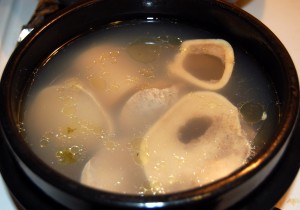
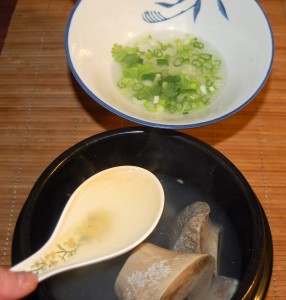
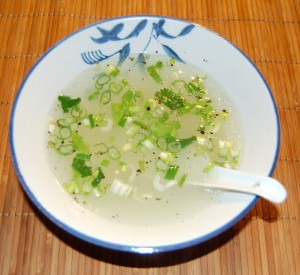
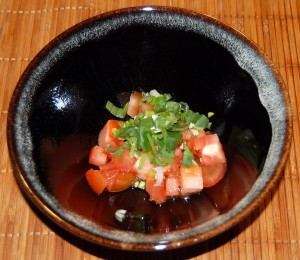
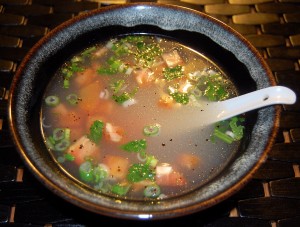
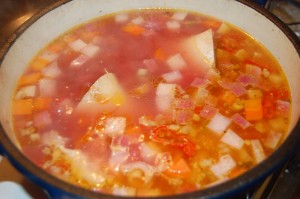
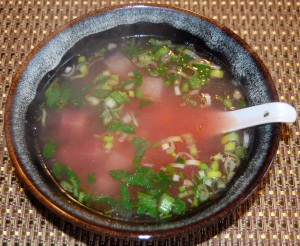




Paul, how many times a week do you recommend fasting? I mean the 16h fast (skipping breakfast or dinner – or having those foods you suggested)
Are we supposed to do it one/twice a week or everyday?
Thank you, I love your blog its my favourite in the paleo community.
Paul,
do you think that an athlete can apply the protein-sparing modified fast to the 16h fast (eating just protein for breakfast for example)?
For example:
Breakfast: just protein
Lunch and Dinner: Meat/fish/eggs, vegetables, safe starches and added fat.
Hi Paul,
Any thoughts on water intake as it relates to the food intake window that you practice? i.e. water only in daytime window?
Thanks
Hi Paul,
First off, I just want to say how much I love your book and work (I am a chemistry PhD candidate, but have a great passion for nutrition and ancestral health). I have a question, though, about a possible alternative to intermittent fasting. I realize that intermittent calorie restriction is incredibly beneficial for weight loss, longevity, and general health, but, personally, I still find it almost impossible to do a full day of fasting (even with ~500 calories on the fast day). I suspect this may be due to the fact that I have some endocrine issues, but I also think, in general, it’s much harder for women to fast, and may even be detrimental (Mark Sisson wrote a very interesting and comprehensive discussion of this: http://www.marksdailyapple.com/women-and-intermittent-fasting/#axzz3NxU1ZC88). One thing I have found in the literature is intermittent carbohydrate restriction instead of strictly intermittent calorie restriction. You touched on this topic once very briefly in one of your blog posts, and this technique appears well-established among athletes, but is only just starting to be studied in a more methodical, scientific manner. Here are some references on this work, the most relevant being the first one:
http://www.abstracts2view.com/sabcs11/viewp.php?nu=P3-09-02
Harvi, et al. “The effects of intermittent or continuous energy restriction on weight loss and metabolic disease risk markers: a randomized trial in young overweight women.” Int J Obes (Lond) 35.5 (2011).
I think this is some fascinating new research for a number of reasons. First off, I am curious about the physiological relationship between intermittent calorie restriction and intermittent carb restriction. I.e., are the observed benefits of intermittent calorie restriction that have been so well-documented in the literature in fact the result of the carbohydrate restriction that must (almost) always accompany a calorie-restricted fast? A way to test this would be to have a fast of somewhere around 400 carb calories (what I understand from your book to be the minimum needed per day). This would still count as a calorie-restriction, but not a carbohydrate restriction, so hopefully the effects could be separated and studied. Further, if it turns out that both intermittent calorie- and intermittent carb-restriction are beneficial, what are the different individual effects, if they do in fact differ, and can you achieve both effects by doing both simultaneously? These are just a few of the questions that one could ask on the topic, and clearly there needs to be a lot more research on the subject, as it is very fascinating and relevant.
But, getting back to the question at hand, I wanted to get your opinion on this method of intermittent carb-restriction in place of intermittent calorie-restriction. Do you personally think that for women (or anyone who has difficulty with intermittent fasting beyond 16-hour daily fasts) this “carb cycling” paradigm could serve an equally beneficial (or perhaps better) purpose as intermittent fasting, both for weight loss and for biochemical markers? This is also assuming that one maintains about constant calorie intake every day; that average carbohydrate intake throughout the week is what you recommend daily, i.e. about 400 carb calories/day; that protein intake remains relatively constant each day and is also at your recommended level; and fat intake varies to make the calorie count approximately constant each day.
Thank you in advance for your insight, and happy New Year!
Meghan
Hello, Paul!
Thank you very much for your work and dedication to science. We all highly appreciate it.
I would like to ask something about fasting.
I eat once a day, in the evening. That means 22.5/1.5 protocol.
For me, this is just a eating manner. I am acceptably hungry until dinner, and I even strength train fasted.
I eat based on my hunger. I do not monitor calories.
I am gaining muscle gradually.
Is this fine?
Or are there any bad effects from longer than 16h fasts?
Thank you in advance!
Best,
Andrei
As long as you can eat enough food in that hour and a half, it’s fine. But you should eat in the afternoon.
My meal is at 6 pm.
Why should I eat in the afternoon?
Better circadian timing.
Thank you for your reply!
I always wake up in the middle of the night, at 1am or so.
It’s been like that for over half a year now.
Do you think it may be related with the meal timing?
I take vitamin D3 in the early morning, on an empty stomach. Is it still absorbed if I eat fats in my evening meal?
Thank you for your help!
Yes, it’s quite possible. Natural time to fall asleep is about 8-9 hours after peak food intake. If you eat at 6 pm and fall back asleep at 2-3 am, that could be the food clock kicking in. Your light clock is probably still pushing a 10-11 pm sleep time.
“Natural time to fall asleep is about 8-9 hours after peak food intake”
Hi Paul, do you have any good links to articles and or refs on this.
on the face of it, this does not bode well for the ‘normal’ 8 hour feeding window when doing 16/8 fasting.
ps. i do not recall the “…fall asleep is about 8-9 hours after peak food intake” being mentioned before, at least not that specifically (tho i will go back a check the book of course).
cheers
“on the face of it, this does not bode well for the ‘normal’ 8 hour feeding window when doing 16/8 fasting”
Why doesn’t it? Suppose you have breakfast at 7am and your main meal at 3pm. Then your “natural” time to fall asleep would be 11pm – this makes sense!
no argument from me there Zoltan.
that’s why i put the ‘normal’ in single quotes…what i was getting at there was…i get the sense a lot of people (possibly the majority? *) achieve 16/8 fasting by skipping breakfast. & starting to feed at 11 am (for example). in that example, that would make the feeding window 11 am to 7 pm (if you stuck to the 8 hours).
Of course you could still have you main meal (peak food intake) at 3 pm, as you mention, or even earlier.
& also you reduce the 8 hr feeding window.
I myself am a ‘breakfast skipper’, always have been. Breakfast is not really my thing.
Tho i have read that if you ‘force’ (or train) yourself to eat breakfast, it does become natural after a while. & your body will come to expect/crave breakfast.
I seem to recall Paul saying that he does not have breakfast (may have recalled incorrectly tho).
Although i guess technically, every body eats a break-fast meal, just not always in the morning 🙂
*i could be completely wrong on the majority comment, i do no have any refs to back that up with.
…on Paul’s breakfast habits, i found this Sept 2014 comment by Paul here;
http://perfecthealthdiet.com/2014/08/ancestral-health-symposium-tak-weight-loss/comment-page-1/#comment-1262862
”
My belief is that the best eating window starts 3 hours after dawn and ends 1 hour before dusk. If that was 6 am to 6 pm in the middle ages, that would be 9 am to 5 pm.
Nowadays, most people start and end their “day” earlier, and rely on artificial lighting.
In our home, it’s 8 am to 8 pm. So for me, 11 am to 7 pm would be optimal. I actually do something like 1 pm to 7 pm but it often slips toward 8 pm in the evening.
“
There’s a natural 8 hour feeding window in the middle of the 12-hour day, and the natural 8-hour sleeping window is exactly 12 hours shifted. Put food intake into the exact middle of the feeding window, and it comes 8 hours before the start of sleep.
Interesting! Thank you.
I indeed go to bed at 9 pm.
So, if I eat at 6 to 7, then I should go to bed a bit later?
Please, answer my question regarding vitamin D.
Is it absorbed if I take it on an empty stomach?
Sometimes when I’m not hungry I also skip breakfast, but it is much more sensible to skip dinner – for a number of reasons. Firstly, my understanding is that bile gets concentrated in the gallbladder during the night, and it’s best to have the gallbladder emptied first thing in the morning. For 100% gallbladder emptying, you need to eat a high-fat breakfast containing a minimum of 15g fat. This is the amount you will find in 3 eggs, for example. Of course it’s best to ingest some protein and fibre, too, but fat is most efficient at this gallbladder emptying business (not surprisingly as bile is needed to emulsify fat for absorption). Your early to mid-afternoon main meal should also contain enough fat (as well as other macro- and micronutrients), but eating a fatty meal for dinner is not a great idea. In fact, digestion in the evening is usually poor, which is why it makes sense to skip dinner altogether. (MCT oil is metabolised differently, so you might find that taking a spoonful of it at dinner time will quench your hunger without causing any digestive issues.) Secondly, it is much easier to go to bed on an empty stomach than to go to work while feeling hungry 🙂 Thirdly, skipping dinner fosters circadian rhythm entrenchment, for the very reason mentioned by Paul: if your main and last meal is at 2pm or 3pm, you are more likely to go to bed at 10pm or 11pm, ie your “food clock” will be aligned with your “light clock,” which is good. And if you do skip dinner, you are more likely to eat breakfast the next day 🙂
Hello Paul!
I’ve been waking up during the night for the past half a year. It’s somewhere between 12 and 2 am.
I used to eat only a dinner at 6 pm to 7:30 pm.
You said to concentrate the main meal at 1 or 2 pm.
However, in the book, you wrote that most carbs should be eaten in the evening.
So, should I eat a meal at 2 pm and another meal at 5 pm?
What would be optimal eating to not wake up during the night?
Best,
Andrei
Hi Andrei,
Yes, getting most calories in the early afternoon, and then eating a lighter dinner with starches followed by a sweet dessert (e.g. a bowl of fruit or berries) is a good plan. Also, check that you are getting enough electrolytes. A cherry tomato with a bit of salt and water before bed may help.
Thank you, Paul!
I will be working to increase my calories in my afternoon meal.
I enjoy a larger dinner, though.
How much fruit do you recommend?
I usually have 2 bananas and an apple for dinner.
Is that OK or is it too much?
That’s fine. That’s about how much fruit we recommend per day, but having extra is fine.
Paul, thank you again!
It’s amazing how you can be so responsive.
It speaks of real commitment.
I like your argument for the natural 8 hour feeding window and 8 hour sleeping time.
How did you get to that?
Does it imply that the feeding window MUST be 8 hours, or is something like 4-6 hours good, as well?
Concerning sleep, I find that 6 hours of deep sleep is very restful.
Hello.
I have to lose weight but I’ve been told by a doctor that fasting causes gallstones. Is this true?
I don’t believe it is possible that it is true and still so many people in the web are recommending fasting. So my guess is that this doctor must be wrong in something, because otherwise many people would be complaining about gallstones, and doctors would appear in radio and tv telling people not to fast. But, how can a doctor be wrong about that?
Thanks
Hi anon,
Undereating (esp of fats) reduces bile flow and gallbladder motility, which can make it easier for gallstones to stay in the gallbladder and grow, instead of being flushed out. This is why dieters are more likely to get gallstones, http://www.ncbi.nlm.nih.gov/pubmed/24321208. However it’s been found (in that paper for instance) that eating adequate fat flushes the gallbladder adequately and gets rid of the increased risk. Intermittent fasting of the type recommended by PHD should reduce gallstone risk. Also, PHD, even for weight loss, is not super low in fat, so there is adequate bile flow, and the supplements/foods of bone stock and vitamin C support bile flow. Don’t let your doctor deter you from following our advice.
Best, Paul
Hi Paul,
I have type one diabetes and am using dextrose and/or honey in tea to keep levels afloat during the 16 hour fasting window. It is nigh on impossible to keep things 100% balanced for 16 hours, though I have been slowly reducing my both my basal and bolus insulins, which is great.
I wondered if the dextrose and honey are likely to significantly interfere with autophagy?
Thanks.
A bit, but it’s more important to keep blood glucose stable and liver glycogen in good shape. Sounds like you are doing a great job!
Hi Paul,
Thank you for this amazing diet. I loved reading the book and me and my husband both feel much better on the diet.
I tend to eat meals at breakfast and lunch time and then just have some white chocolate and a coffee in the evening.
For some reason I really crave the white chocolate and have been having 90g per day. Is that too much chocolate?
Thank you
Hi Susan,
That’s a lot of white chocolate, but it is still probably healthful. See http://perfecthealthdiet.com/2012/11/chocolate-what-is-the-optimal-dose/ and http://perfecthealthdiet.com/2014/03/white-chocolate/. Personally I’d be more concerned about the coffee in the evening, it could interfere with sleep.
Best, Paul
Paul – As you recommend, I do a daily fast and have black coffee on an empty stomach each morning. My stomach seems fine with the practice but I read that black coffee on an empty stomach will irritate the stomach. Ever see any evidence of that? My stomach seems fine but any negative may not show up in the short term. Thanks!
Hi EF,
While some compounds in coffee can increase stomach acid production and some people with acid reflux issues experience this as irritation, in general coffee is good at clearing germs out of the small intestine and should be curative for most digestive complaints.
Best, Paul
Hi Paul, do you think the same benefits would also hold true for decaf coffee? What are your general thoughts on decaf?
Personally I find regular coffee too stimulating and I don’t like the idea of forming any kind of dependency.
Decaf has most of the benefits of regular coffee.
Hi Paul,
you said that the best moment for eating the most of your daily calories is between noon and 4 p.m:
If someone is out (work or something else) and he cannot eat a large meal in this window, what can be done to save the circadian timing?
Hi Paul
This guy calls intermittent fasting “nothingsauce.” Any thoughts?
http://caloriesproper.com/intermittent-fasting-is-nothingsauce/
Paul, the most convenient time for me to get my daily 3 egg yolks(in my case, whole eggs), is in the morning…in my coffee. I like it with 2 tablespoons of salted butter which is perfectly emulsified by the eggs. I start drinking the coffee by about 8 o clock and usually finish it by 10:30. I also have about a 3rd of an unsweetened baking chocolate bar from 10:30 to 12. Then I have lunch at about 1:30 to 2pm.
I don’t believe I take in 50 carb/protein calories in a short enough window of time to break out of this…theoretical…hypothetical…questionable state of “fasting”…so I imagine it’s theoretically possible to get some of the fasting benefits this way. Would I be better off snacking on the chocolate after dinner and finding some less convenient time to eat the yolks? I can leave the butter out if that somehow helps.